"Some minor contaminant that wasn’t quite enough to wreck coherence?" Ilene suggested.
Cass made a noncommittal sound. It would be nice to have a view from several different angles, allowing them to pick up any asymmetry in the radiation. But they’d been woken by the arrival of data from the cluster of detectors closest to the femtomachine; information from the second-closest would take almost another microsecond to reach the same spot, by which time they’d be long gone. Her old embodied self would get to see the big picture, albeit more coarsely grained. Her own task — her own entire raison d'être — was to make what sense she could of the clues at hand.
The energy spectrum wasn’t jagged and complicated, or even particularly broad. It didn’t look wrong enough to be the product of a sausage- or pancake- or doughnut-shaped region of novo-vacuum, let alone some more exotic structure with a convoluted fractal border. The peak had about the same width, and the same kind of smooth symmetry as the predicted curve; it was merely displaced upward along the energy scale, and the shoulders on either side were reversed. It wasn’t literally a mirror image of the expected result, but Cass felt sure it was the product of some fairly simple transformation. If you changed a single plus sign to a minus, somewhere deep in the underlying equations, this would be the outcome.
Zulkifli was one step ahead of her. "If you modify the operator that acts on the border, swapping the roles of the inside and outside of the region, you get a perfect match."
Cass experienced a shiver of fear, all the more disturbing for evoking the phantom viscera of her Earth body. If Zulkifli’s claim was true, then the region was expanding, not collapsing .
She said, "Are you sure that works?"
Zulkifli made his private calculations visible, and superimposed the results on the histogram. His curve ran straight through the tops of all the bars. He’d found the plus sign that had turned into a minus. Except —
"That can’t be right," she declared. The simple role reversal he’d suggested was elegant, but nonsensical: it was like claiming that they were seeing the light from a fire in which ashes were burning into wood. Conservation of energy was a subtle concept, even in classical general relativity, but in QGT it came down to the fact that the flat vacuum state remained completely unchanged from moment to moment. An awful lot of physics flowed from that simple requirement, and though it was remote from everyday notions of work, heat, and energy, a billion commonplace events that Cass had witnessed throughout her life would have been impossible, if the truth were so different that Zulkifli’s border operator was the right choice.
There was silence. No one could contradict her, nor could they deny that Zulkifli’s curve matched the data.
Then Livia spoke. "The Sarumpaet rules make our own vacuum perfectly stable; that’s the touchstone Sarumpaet used from the start. But the novo-vacuum is not decaying in the way those rules predict. So what’s the simplest way to reconcile the contradictions?" She paused for a moment, then offered her own solution. "Suppose both kinds of vacuum are perfectly stable, on their own. If there’s a wider law that makes that true — with the Sarumpaet rules as a special case — we would never have stumbled on it in the staged experiments, because we never had the full set of virtual particles that constituted a viable alternative vacuum."
Yann grinned appreciatively. "All states with the potential to be a vacuum must be treated equally? However exotic we might think they are, they’re all eternal? Very democratic! But wouldn’t that imply a stalemate? Wouldn’t that freeze the novo-vacuum, leaving the border fixed?"
Ilene said, "No. The dynamics needn’t be that evenhanded. One side could still convert the other at a boundary. The one with the fewest species of particles, I expect."
By any count, the novo-vacuum was the more streamlined of the two . Cass was more angry than afraid, though. Talk of a runaway vacuum conversion was intolerable; they’d spent five years ruling that out, validating the Sarumpaet rules for every related graph. They could not have been more cautious.
Rainzi said calmly, "Suppose the novo-vacuum is growing. What happens when it encounters some contamination? It’s a coherent state that could only be created in perfect isolation, in the middle of the purest vacuum in the universe. It’s fragility incarnate. Once it hits a few stray neutrinos and decoheres, it will be forty-eight flavors of ordinary vacuum — all of them in separate histories, all of them harmless."
Livia glanced warily at Cass. It was as if she wanted Cass to be the bearer of bad news for a change, rather than always hearing it from her.
Cass obliged her. "I wish you were right, Rainzi, but that argument’s biased. It’s just as correct to say that our own vacuum is a superposition of different curved versions of the novo-vacuum. If there really is a new dynamic law at work here, and if it preserves the novo-vacuum precisely, then according to that law, it’s our vacuum that’s the delicate quantum object waiting to decohere."
Rainzi pondered this. "You’re right," he conceded. "Though even that doesn’t tell us much about the border. Neither of the specialized laws that apply on either side can hold there. We’ll only understand the fate of the border if we can understand the general law."
Cass laughed bitterly. "What difference does it make, what we understand? We won’t be able to tell anyone! We won’t be able to warn them!" The border wasn’t traveling at lightspeed — or they wouldn’t have been woken at all before it swept over the femtomachine — but it was unlikely to be spreading so slowly that their originals would see it coming, let alone have a chance to evacuate. In any case, what she and her fellow clones knew was worthless; they had no way to share their knowledge with the outside world. The femtomachine was designed to do no more than compute its inhabitants, for their own benefit. All it would leave behind was debris. Even if they could encode a message in the decay products, no one would be looking for it.
A lifetime’s worth of defensive slogans about the perils of VR started clamoring in her head. She wanted to scrape this whole illusion off her face, like a poisonous, blinding cobweb; she wanted to see and touch reality again. To have real skin, to breathe real air, would change everything . If she could only see the world through her own eyes, and react with the instincts of her own body, she knew she could flee from any danger.
It was so perverse it was almost funny. She was perceiving the danger a billion times more clearly than she could ever have hoped to if she’d been embodied. She had all her reflexes at her disposal, and all her powers of reasoning, operating a billion times faster than usual.
It was just a shame that all of these advantages counted for nothing.
Zulkifli said, "The brightness is increasing."
Cass examined the evidence as dispassionately as she could. A slow, steady rise in the rate of particle production was apparent now, clearly distinguishable from the background fluctuations that had initially masked it. That could only mean that the border was growing. Short of some freakishly benign explanation for this — a fractal crinkling that allowed the border to increase in area while the volume of novo-vacuum itself was shrinking — this left little room for doubt about which vacuum was being whittled away to produce the particles they were seeing. The thing she had always thought of as an elegant piece of whimsy — as charming and impractical as a mythical beast that might be bioengineered into existence, and kept alive briefly if it was pampered and protected, but which could never have lasted five minutes outside its glass cage — was now visibly devouring its ancient, wild cousin. She had summoned up, not a lone, defenseless exile from a world that could never have been, but the world itself — and it was proving to be every bit as autonomous and viable as her own.
Читать дальше
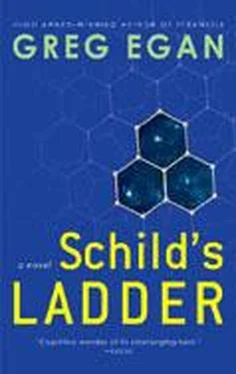
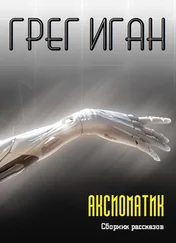
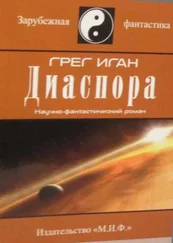

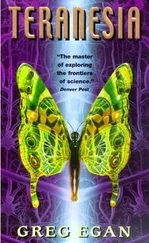
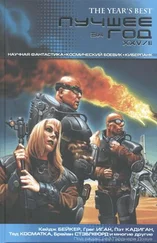


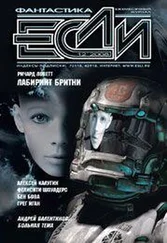
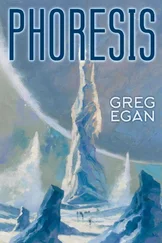
![Грег Иган - Рассказы [компиляция]](/books/419837/greg-igan-rasskazy-kompilyaciya-thumb.webp)
